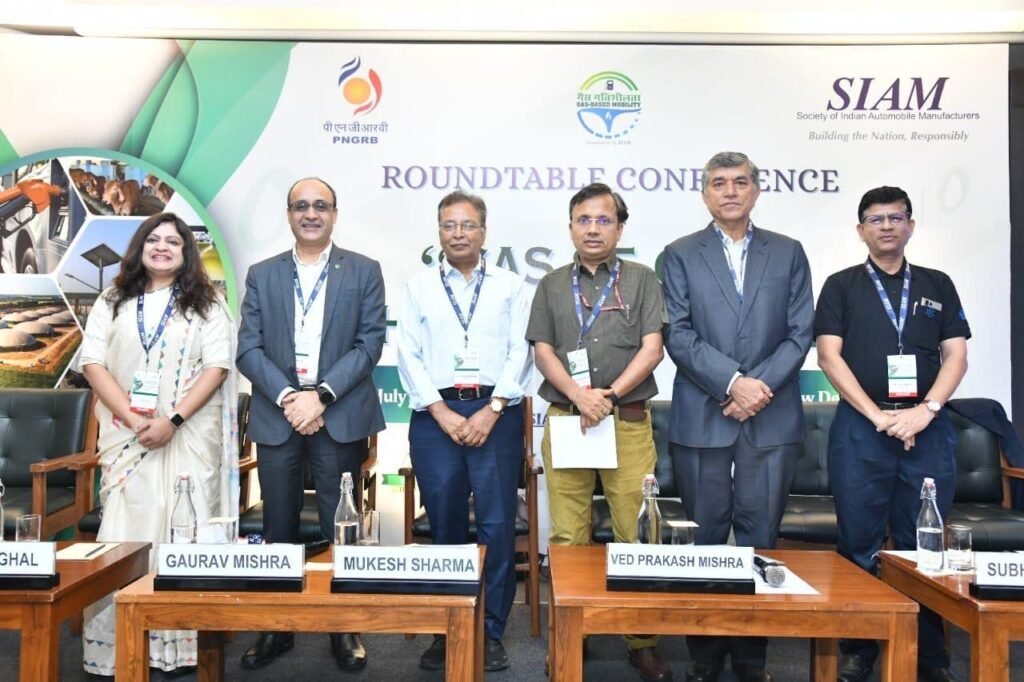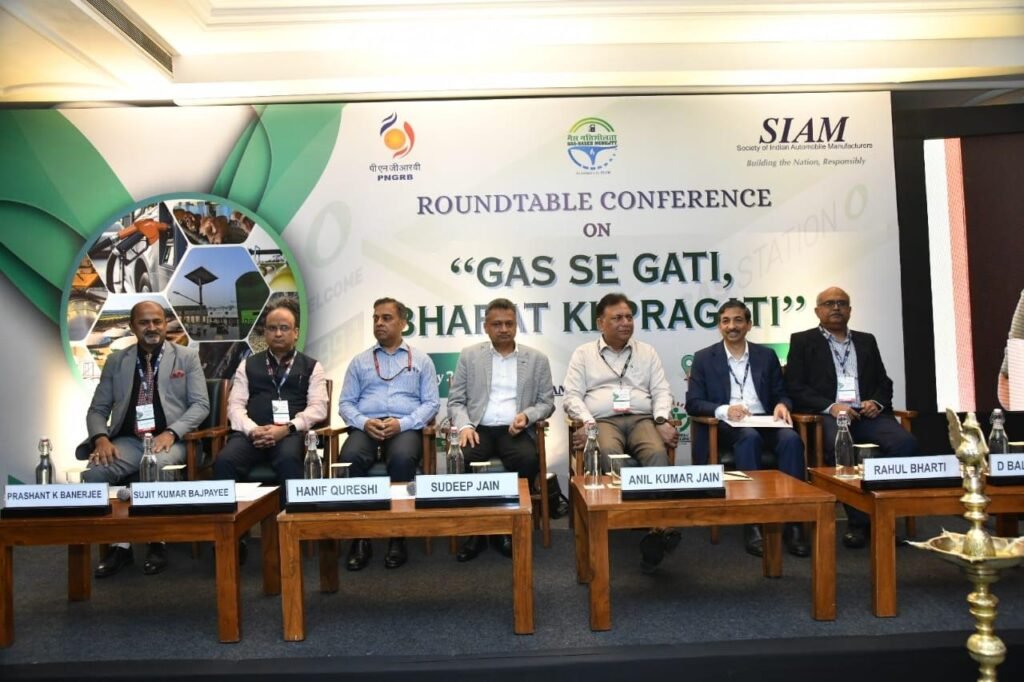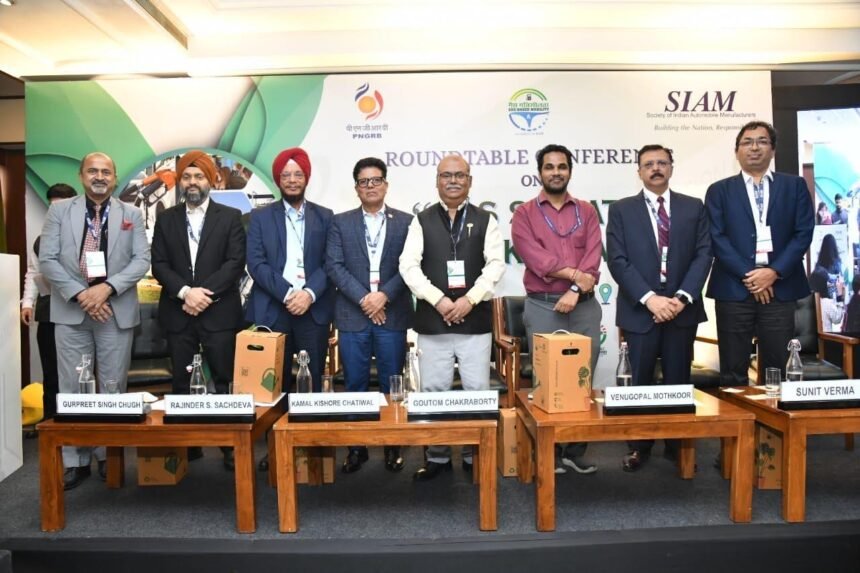Staff Writer
New Delhi: The Society of Indian Automobile Manufacturers (SIAM), in collaboration with the Petroleum and Natural Gas Regulatory Board (PNGRB), hosted a landmark roundtable conference titled “Gas se Gati, Bharat ki Pragati” at the India Habitat Centre in New Delhi on Monday. The event marked a significant push towards gas-based mobility in India, bringing together senior government officials, automotive industry leaders, and energy experts to discuss the future of sustainable urban and long-haul transportation through Compressed Natural Gas (CNG), Compressed Bio-Gas (CBG), and Liquefied Natural Gas (LNG).
Organised under SIAM’s गैस गतिशीलता (Gas Mobility) initiative, the roundtable focused on accelerating the adoption of clean and efficient fuel alternatives to reduce India’s carbon footprint and fossil fuel dependency.
Delivering the opening address, Mr. Prashant K Banerjee, Executive Director of SIAM, emphasised India’s leadership in gas-fuel mobility. “India is already the largest user of gas fuels in the mobility sector globally. From CNG cars to becoming the nation with the biggest gas-powered bus and three-wheeler fleets, the progress has been substantial. Last year’s launch of the world’s first CNG-powered two-wheeler is yet another milestone in this journey,” he said.
Dr. Hanif Qureshi, Additional Secretary, Ministry of Heavy Industries, highlighted the pivotal role of India’s $240 billion automobile sector in achieving the national goal of carbon neutrality by 2047. He noted that gas-based mobility, bolstered by the Production Linked Incentive (PLI) scheme, is a major driver of Viksit Bharat and Atmanirbhar Bharat, with emphasis on localising gas vehicle components and technologies.
Speaking on the renewable energy potential, Mr. Sudeep Jain, Additional Secretary, Ministry of New and Renewable Energy, pointed out the opportunity to convert agricultural waste into energy. “India generates 228 MMT of agricultural residue annually. Converting just 10% of our oil imports into CBG can be transformative. Currently, with only 200 CBG plants, we need to boost demand, and Indian OEMs have the potential to lead globally in green automobile manufacturing,” he stated.

From the industry perspective, Mr. Rahul Bharti, Senior Executive Director, Maruti Suzuki India Ltd., applauded government efforts in supporting CNG infrastructure growth, noting that nearly 10,000 stations would be operational by 2025. He described CBG as a game changer for rural India and praised ongoing innovations in fuel efficiency for CNG two-wheelers, which have improved from 26 km/kg to 34 km/kg.
Addressing environmental concerns, Dr. Sujit Kumar Bajpayee, Member of the Commission for Air Quality Management (CAQM), stressed the need for immediate adoption of alternative fuels to tackle pollution in Delhi NCR. “With PM10 emissions averaging over 200 last year, gas-based mobility offers a decentralised and cleaner solution, turning pollution into power,” he said.
Delivering the keynote address, Dr. Anil Kumar Jain, Chairperson of PNGRB, underscored the importance of gas-based mobility in India’s energy transition. “Decarbonisation in transport is central to our sustainability goals, and the success of CNG adoption shows the effectiveness of using existing infrastructure for future-ready solutions,” he said.
The thematic session, “Accelerating Future Growth and Promoting Gas-Based Mobility”, was chaired by Mr. Ved Prakash Mishra, Joint Secretary, Ministry of Environment, Forest and Climate Change. He reaffirmed the interim role of gas until full-scale EV transition and praised the impact of CNG in Delhi’s air quality improvement over the past decade.
Contributing academic insights, Dr. Mukesh Sharma, Professor at IIT Kanpur, shared data on air pollution and mobility challenges. He cited that converting BS-IV vehicles to CNG could reduce particulate matter by 90–95%, showcasing the fuel’s potential in improving urban air quality.

Dr. Gaurav Mishra from the Ministry of New and Renewable Energy emphasised India’s bioenergy potential, noting that 11.5% of the country’s renewable capacity comes from bioenergy. He called for further promotion of CBG and waste-to-energy technologies to enhance energy security and reduce environmental degradation.
The session also featured technical presentations by Mr. Subhash Kumar, Director General of the Association of CGD Entities (ACE); Mr. Ashu Shinghal, Managing Director of Mahanagar Gas Ltd.; and Mr. Milind J Pagare, Vice President (R&D), Bajaj Auto Ltd., who discussed advancements in two- and three-wheeler gas technologies. The session was moderated by Ms. Payal Goel, Director at Deloitte India.
A key panel discussion titled “Fuelling the Shift: CBG & LNG for Today’s Mobility and Beyond” was moderated by Mr. Gurpreet Singh Chugh, Managing Director, ICF. During the session, Mr. Venugopal Mothkoor, Senior Specialist at NITI Aayog, highlighted the importance of LNG and electric trucking in India’s net-zero roadmap by 2070. He noted that scaling CBG would require addressing infrastructure investment challenges to replicate ethanol’s rural success story.
The panel also included senior representatives from Tata Motors, GAIL Gas Ltd., Indraprastha Gas Ltd. (IGL), VE Commercial Vehicles, and PNGRB, who offered insights into India’s expanding gas-based transportation economy.
Mr. Ashish Chutani, Chairman of the SIAM Gas-Based Mobility Group and Head of Government & Policy Affairs at Maruti Suzuki India Ltd., delivered the closing remarks and vote of thanks, reiterating the industry’s dedication to advancing India’s sustainable mobility goals.
The roundtable concluded with a unified call for collaboration among stakeholders to embed gas-based mobility as a core component of India’s transport strategy. The initiative aligns with the nation’s long-term goals of carbon neutrality by 2070 and achieving the vision of Viksit Bharat by 2047.








